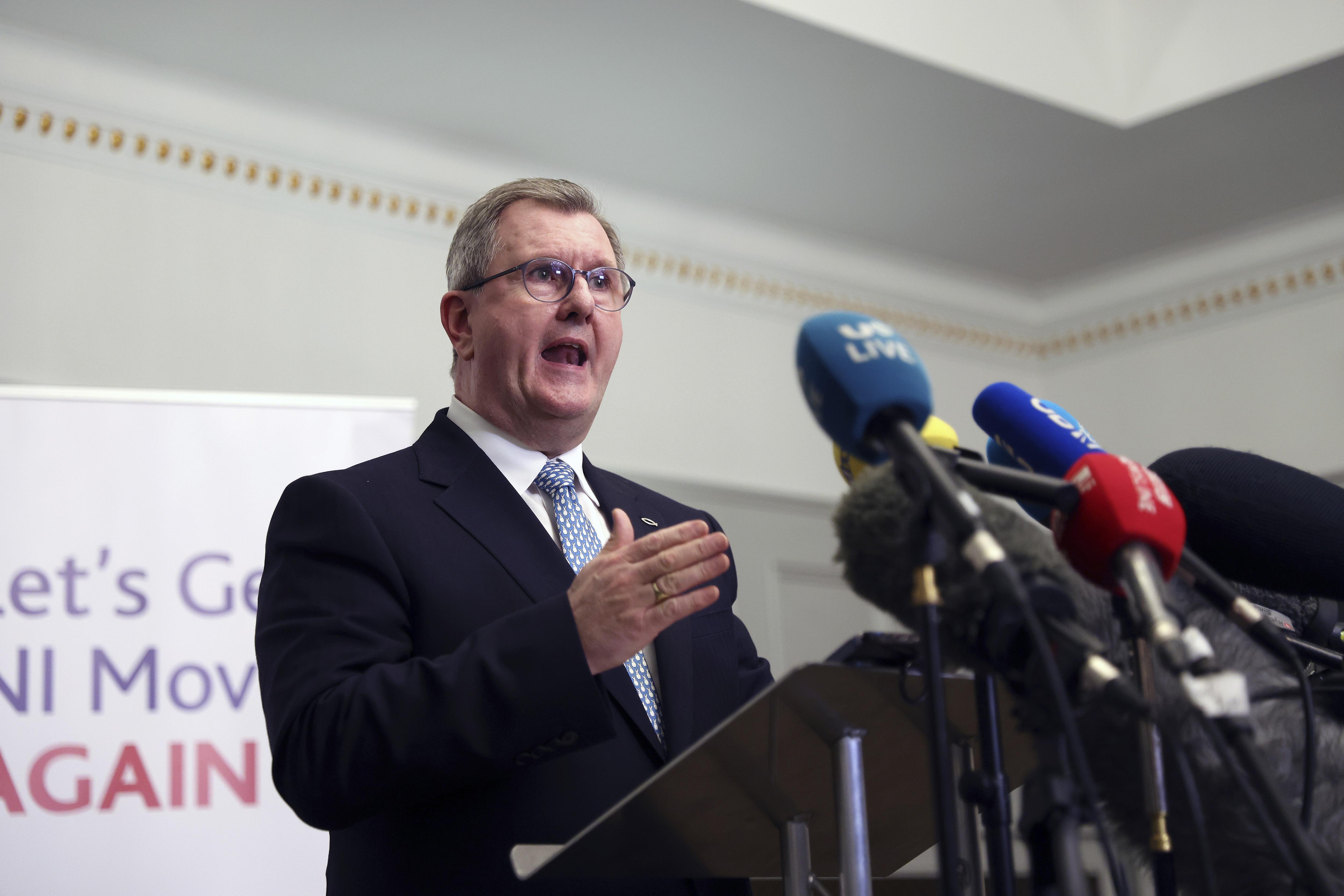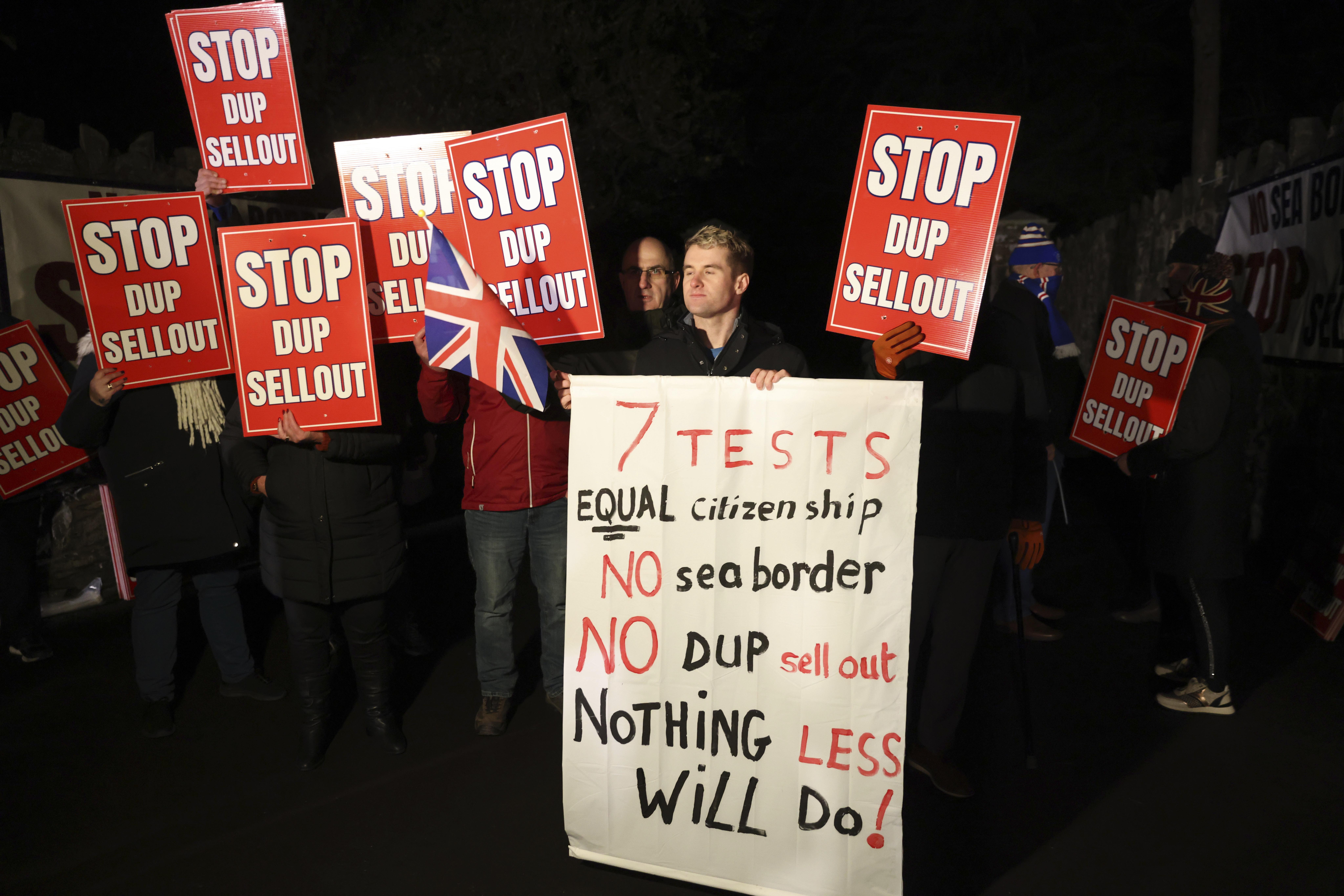 Democratic Unionist Party (DUP) leader Jeffrey Donaldson speaks to the media during a press conference at Hinch Distillery, Temple, Northern Ireland, Jan 30, 2024. (PHOTO / AP)
Democratic Unionist Party (DUP) leader Jeffrey Donaldson speaks to the media during a press conference at Hinch Distillery, Temple, Northern Ireland, Jan 30, 2024. (PHOTO / AP)
BALLYNAHINCH, Northern Ireland - The leader of Northern Ireland's Democratic Unionist Party (DUP) said it had reached a deal with the British government on the operation of post-Brexit trade rules that would allow it to return to the region's power-sharing government.
Northern Ireland has been without a devolved government for almost two years after the DUP walked out in protest over the trade rules, which it said created barriers with the rest of the United Kingdom and undermined Northern Ireland's place in it.
ALSO READ: Poll: UK majority support rejoining the EU single market
A return to government by the region's largest pro-British party offers a way out of a crisis that posed an existential threat to the political settlement underpinning Northern Ireland's 1998 peace deal, and also puts an end to one of the most difficult aspects of Britain's withdrawal from the European Union.
Earlier around 50 protesters, some holding Union Jack flags and signs saying "Stop DUP sellout", gathered outside the hotel where Donaldson briefed party members after months of closely guarded talks
"I am pleased to report that the party executive has now endorsed the proposals that I have put to them," Jeffrey Donaldson told a news conference in the early hours of Tuesday morning after an hours-long briefing to DUP lawmakers and party members.
"Subject to the binding commitments between the Democratic Unionist Party and the UK government being fully and faithfully delivered as agreed... the package of measures in totality does provide a basis for our party to nominate members to the Northern Ireland executive," he added.
READ MORE: London mayor says Brexit has cost UK over $178b so far
Any deal risked a split in the DUP while also providing ammunition to rivals including the much smaller Traditional Unionist Voice (TUV) party, who oppose any compromise, ahead of a UK general election due by late January next year.
Earlier around 50 protesters, some holding Union Jack flags and signs saying "Stop DUP sellout", gathered outside the hotel where Donaldson briefed party members after months of closely guarded talks.
The DUP leader said the party made a decisive decision and that the result of a vote was "very clear".
 Loyalists protest outside the grounds where the Democratic Unionist Party executive meeting is taking place at Larchfield Estate in Lisburn, Northern Ireland, Jan 29, 2024. (PHOTO / AP)
Loyalists protest outside the grounds where the Democratic Unionist Party executive meeting is taking place at Larchfield Estate in Lisburn, Northern Ireland, Jan 29, 2024. (PHOTO / AP)
Sinn Fein leader
Donaldson said the measures, which will be underpinned by new UK laws, will remove checks for goods moving within the UK and remaining in Northern Ireland, guarantee unfettered access for Northern Ireland businesses to the UK market and safeguard the region's place in the UK.
Sinn Fein leader Mary Lou McDonald said she was optimistic that the assembly would be restored by Feb 8
He said London would publish details "in due course" and could move quickly to enable the DUP to take its place back in Belfast's Stormont Assembly.
ALSO READ: Dublin to decide on legal action over N. Ireland amnesty law
Irish nationalists and pro-British unionist politicians are obliged to share power under the terms of the 1998 Good Friday peace accord that ended three decades of sectarian violence in Northern Ireland.
Britain's Northern Ireland Minister, Chris Heaton-Harris, said on social media platform X that the parties entitled to form an executive would meet later on Tuesday and that he hoped the assembly would return "as soon as possible".
READ MORE: Architects of Northern Ireland peace see hope beyond Brexit deadlock
Sinn Fein leader Mary Lou McDonald, whose Irish nationalist party became the largest in the British-run region for the first time at elections shortly after the DUP walkout, said she was optimistic that the assembly would be restored by Feb 8.
That will allow Sinn Fein to assume the role of Northern Ireland first minister, the latest political milestone for the former political wing of the Irish Republican Army (IRA) who want to leave the United Kingdom and form a united Ireland.


